A Sudden Attack on a Star's Residence
The tranquil residence of Telugu superstar Allu Arjun became the unlikely epicenter of political controversy when a group of protestors launched a brazen attack on his home situated in Hyderabad. What began as a day like any other for Allu Arjun, star of the much-anticipated film 'Pushpa 2', quickly devolved into chaos. Protesters, said to be affiliated with the Osmania University Joint Action Committee (OU JAC), forcibly entered the premises, loudly chanting slogans demanding justice and reparations for the tragic death of a woman in a stampede during a movie screening. The demonstrators resorted to vandalism by hurling tomatoes and damaging decorative pots, causing a scene of mayhem and unrest.
Denial and Political Maneuvering
As news of the incident spread, amidst the mounting public and media frenzy, the Congress party swiftly moved to disassociate themselves from any connection to the attack, categorically denying any involvement. Political tensions were already simmering, and this incident served as the perfect spark to ignite a larger confrontation. The BJP has leveled strong accusations towards the Congress, alleging their indirect orchestration of the attacks. The BJP's claims hinge on a photograph of Reddy Srinivas, identified as the Kodangal Youth Congress President, seen alongside Telangana’s Chief Minister Revanth Reddy. However, these assertions have been met with firm denials from the Congress camp, labeling them as unfounded and politically motivated attempts to tarnish their reputation.
Police Action and Public Statements
Following the disruptive event, local law enforcement acted promptly, detaining those involved in the acts of vandalism. A formal case was registered, ensuring that the perpetrators would face justice. In light of these developments, Telangana Chief Minister Revanth Reddy made public statements condemning the violence and urged both the State Director General of Police (DGP) and the City Police Commissioner to take rigorous measures to prevent further incidents and bring the offenders to justice. These statements underscore the political weight and significance of this incident in the current local political landscape.
Family Reaction and Future Implications
Amid all the political drama and accusations, Allu Arjun's father, Allu Aravind, took a calm yet firm stance. He addressed the media, emphasizing patience and expressing confidence in the judicial process to address the wrongful acts. Aravind's composed reaction serves as a reminder of the importance of legal precedents and procedural justice, as he cautioned against jumping to conclusions or inciting further chaos among the public. He also stressed that any further attempts to create disorder around the incident would be promptly addressed by the authorities.
A Brewing Political Storm in Telangana
This unexpected conflagration at a celebrity's home has ballooned into a major political squabble, adding another layer to the already complex political landscape of Telangana. The incident highlights the existing tensions between the regional political factions—BRS, BJP, and Congress—all of which now find themselves embroiled in a heated exchange about responsibility, accountability, and political maneuvering. As the dust settles and investigations continue, the region awaits to see how these events will shape future political relations and electoral strategies among the involved parties. This incident could potentially have long-lasting effects on the political scene, influencing narratives and public perceptions heading into upcoming elections.
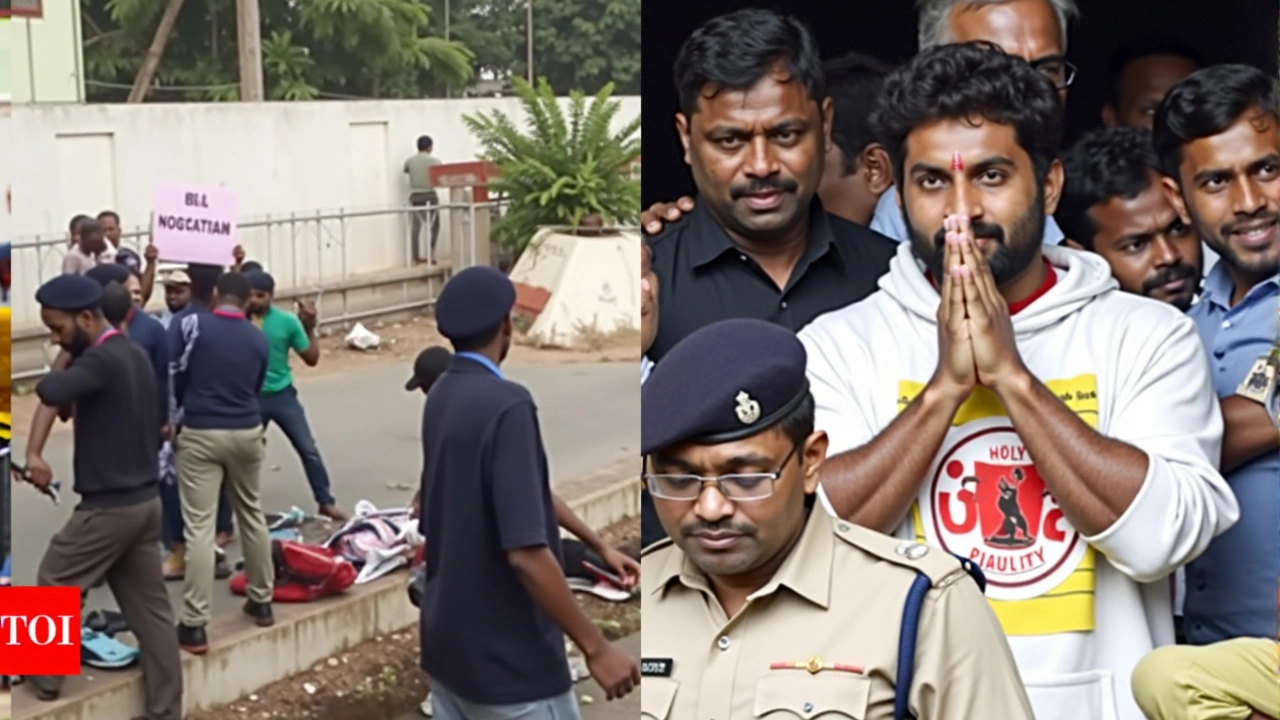
The Cultural and Social Context
The incident, while primarily a political altercation, brings to light the broader cultural and social implications prevalent in India, particularly in regions like Telangana, where film actors are not just entertainers, but cultural icons. Allu Arjun is cherished not only in his home state but throughout the country, as someone who represents the aspirations and dreams of many. This altercation poses significant concerns about the intersection of celebrity culture and political machination, destabilizing the generally harmonious relationships between regional stars and their multitudinous fanbases. It raises questions about the extents and boundaries celebrities must navigate as they become unwilling participants in political chessboards. The event further sheds light on the responsibilities of political entities to maintain civility and lawful discourse, curbing the propensity for violent and destructive actions to be employed as political tools.

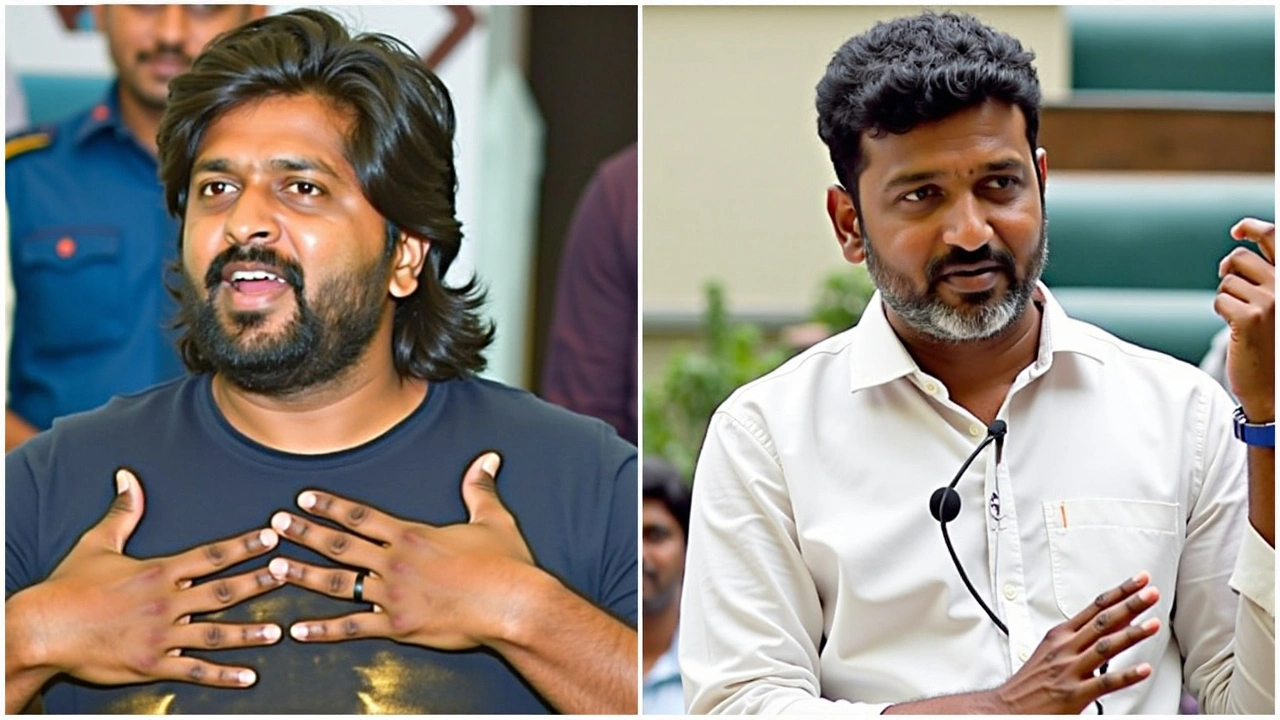
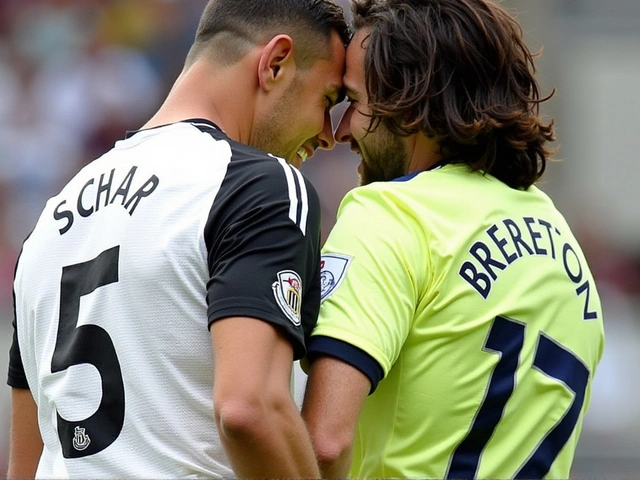


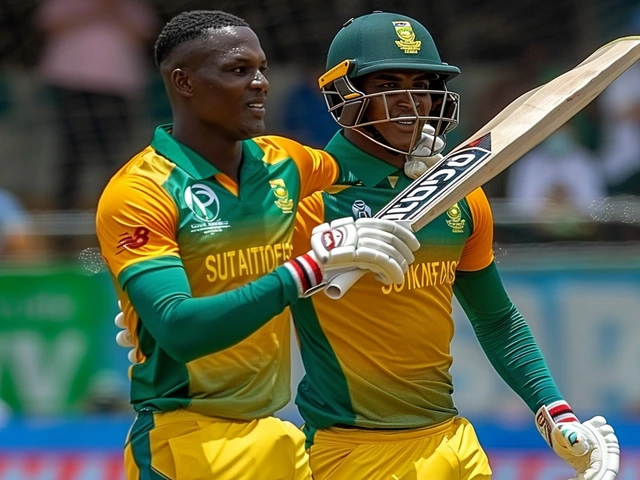

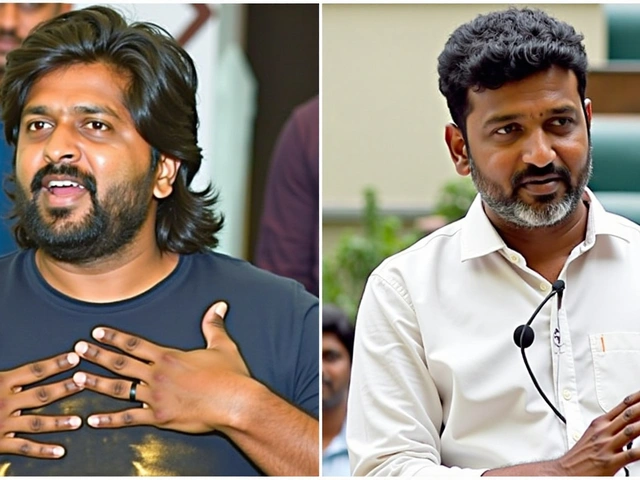
sujaya selalu jaya
December 23, 2024 AT 17:41The incident is unsettling.
Ranveer Tyagi
December 27, 2024 AT 10:18Listen up everybody!!! The law is crystal clear – any mob that storms a private residence is liable for assault, property damage, and criminal intimidation!!! The police must file FIRs under Sections 352, 354, and 380 of the IPC and seize any weaponry!!! Citizens deserve safe homes, not political battlegrounds!!! If the perpetrators are linked to any party, they should face swift prosecution!!! No excuses, no delays!!!
Tejas Srivastava
December 31, 2024 AT 02:55What a spectacle!!! Tomatoes flying, pots shattering, slogans echoing through the night – it felt like a chaotic theater of outrage!!! The streets of Hyderabad turned into a storm of anger, and every window seemed to tremble with the chants!!! Yet, amidst the frenzy, the quiet dignity of a star’s home stood defiant!!!
JAYESH DHUMAK
January 3, 2025 AT 19:31The recent vandalism at Allu Arjun's residence encapsulates a troubling convergence of celebrity culture and partisan politics in Telangana. While the immediate incident involved the unlawful entry and property damage by a group identifying with the Osmania University Joint Action Committee, its ramifications extend far beyond mere physical destruction. Historical precedent illustrates that political actors have frequently co-opted popular cultural figures to legitimize their agendas, thereby blurring the lines between entertainment and governance. In this context, the alleged involvement of Congress-affiliated individuals, as suggested by photographic evidence, warrants meticulous forensic examination to substantiate any claims of complicity. Moreover, the BJP's rapid attribution of blame underscores a strategic maneuver to capitalize on public sentiment and erode the opposition's credibility. Legal scholars assert that, under Indian jurisprudence, the right to protest does not extend to the violation of private property or the endangerment of individuals, as enshrined in Article 19(1)(a) and the protective provisions of the Indian Penal Code. Consequently, law enforcement agencies bear a constitutional duty to pursue impartial investigations, ensuring that due process is upheld irrespective of political affiliations. The involvement of the state’s chief minister in publicly condemning the violence further emphasizes the state's responsibility to safeguard citizens from political intimidation. Simultaneously, the measured response by Allu Aravind, advocating patience and reliance on judicial mechanisms, reflects an adherence to the rule of law that should be commended. From a sociopolitical perspective, the incident also highlights the heightened expectations placed upon regional film icons, who often serve as informal ambassadors of cultural identity. The public's reaction, oscillating between solidarity with the star and criticism of the protestors' tactics, reveals underlying fissures within the electorate concerning the appropriate channels for political expression. It is essential, therefore, for political parties to delineate clear boundaries that separate legitimate dissent from unlawful aggression. The media’s role in amplifying the narrative must also be scrutinized to prevent sensationalism that could exacerbate tensions. In sum, the Hyderabad vandalism episode constitutes a microcosm of broader democratic challenges, demanding a balanced response that protects civil liberties while enforcing legal accountability. The forthcoming judicial and investigative outcomes will likely set precedents for how future intersections of celebrity and politics are navigated in the region.
Santosh Sharma
January 7, 2025 AT 12:08While the urgency in your call for swift justice is clear, it is equally important to channel that energy into constructive dialogue with law‑enforcement agencies and community leaders, ensuring that the response is both effective and measured.
yatharth chandrakar
January 11, 2025 AT 04:45It would be useful to examine the procedural steps the police have taken so far, such as the registration of FIRs and the assignment of investigative teams, to assess whether due process is being followed.
Vrushali Prabhu
January 14, 2025 AT 21:22Man, that whole tomoto‑throwing scene was like a crazy movie set gone wrong – totale chaos but also kinda wild, y'know?
parlan caem
January 18, 2025 AT 13:59What a pathetic stunt – these so‑called protestors are nothing but thuggish mobsters trying to cheapen real issues for attention.
Mayur Karanjkar
January 22, 2025 AT 06:36The conflation of artistic reverence with political dissent reveals a paradoxical dialectic within contemporary civic discourse.
Sara Khan M
January 25, 2025 AT 23:13Meh, just another headline 🤷♀️
shubham ingale
January 29, 2025 AT 15:50Let's keep the conversation positive and hope for peaceful resolutions! 🌟
Ajay Ram
February 2, 2025 AT 08:27The recent events underscore how deeply intertwined cultural icons are with the sociopolitical fabric of Telangana, a relationship that dates back to the early days of regional cinema when film stars served as informal emissaries of collective aspirations. As we reflect on the symbolic weight carried by figures such as Allu Arjun, it becomes apparent that their homes, like public squares, can inadvertently transform into stages for broader societal debates. This phenomenon is not merely incidental; it reflects a historical pattern wherein popular culture becomes a conduit for expressing dissent, especially in contexts where formal channels are perceived as inaccessible. Consequently, the responsibility that rests upon both the celebrity and the citizenry is to navigate this terrain with sensitivity, ensuring that admiration does not translate into passive endorsement of political extremities. Moreover, the role of the media in amplifying these incidents must be calibrated to avoid sensationalism that could exacerbate tensions, while still upholding the imperative of transparent reporting. In sum, fostering a dialogue that respects artistic contributions while safeguarding democratic principles is essential for the health of our public sphere.
Dr Nimit Shah
February 6, 2025 AT 01:04Honestly, it's disheartening to see political parties weaponize a beloved actor's home; such tactics only erode genuine patriotism.
Ketan Shah
February 9, 2025 AT 17:41Could you elaborate on how media framing might influence public perception in cases like this, and suggest ways to balance reportage with responsible storytelling?